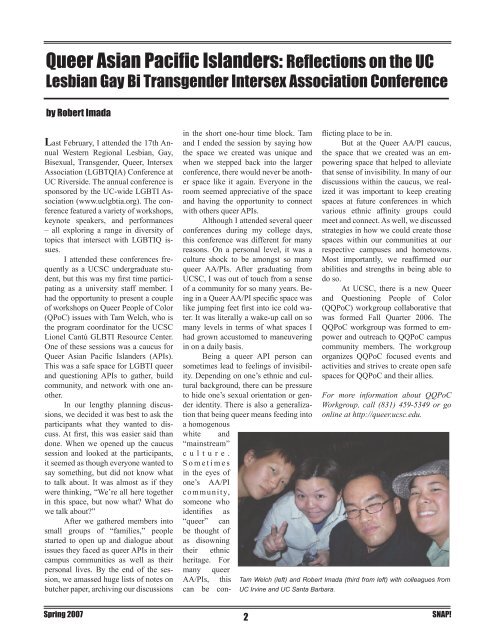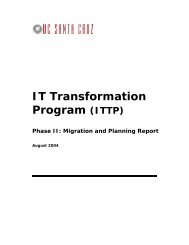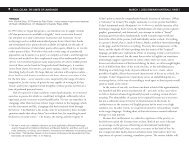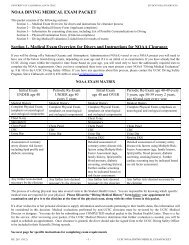UCSC Badminton Club: - For www2 - University of California, Santa ...
UCSC Badminton Club: - For www2 - University of California, Santa ...
UCSC Badminton Club: - For www2 - University of California, Santa ...
You also want an ePaper? Increase the reach of your titles
YUMPU automatically turns print PDFs into web optimized ePapers that Google loves.
Queer Asian Pacifi c Islanders: Refl ections on the UC<br />
Lesbian Gay Bi Transgender Intersex Association Conference<br />
by Robert Imada<br />
Last February, I attended the 17th Annual<br />
Western Regional Lesbian, Gay,<br />
Bisexual, Transgender, Queer, Intersex<br />
Association (LGBTQIA) Conference at<br />
UC Riverside. The annual conference is<br />
sponsored by the UC-wide LGBTI Association<br />
(www.uclgbtia.org). The conference<br />
featured a variety <strong>of</strong> workshops,<br />
keynote speakers, and performances<br />
– all exploring a range in diversity <strong>of</strong><br />
topics that intersect with LGBTIQ issues.<br />
I attended these conferences frequently<br />
as a <strong>UCSC</strong> undergraduate student,<br />
but this was my fi rst time participating<br />
as a university staff member. I<br />
had the opportunity to present a couple<br />
<strong>of</strong> workshops on Queer People <strong>of</strong> Color<br />
(QPoC) issues with Tam Welch, who is<br />
the program coordinator for the <strong>UCSC</strong><br />
Lionel Cantú GLBTI Resource Center.<br />
One <strong>of</strong> these sessions was a caucus for<br />
Queer Asian Pacifi c Islanders (APIs).<br />
This was a safe space for LGBTI queer<br />
and questioning APIs to gather, build<br />
community, and network with one another.<br />
In our lengthy planning discussions,<br />
we decided it was best to ask the<br />
participants what they wanted to discuss.<br />
At fi rst, this was easier said than<br />
done. When we opened up the caucus<br />
session and looked at the participants,<br />
it seemed as though everyone wanted to<br />
say something, but did not know what<br />
to talk about. It was almost as if they<br />
were thinking, “We’re all here together<br />
in this space, but now what? What do<br />
we talk about?”<br />
After we gathered members into<br />
small groups <strong>of</strong> “families,” people<br />
started to open up and dialogue about<br />
issues they faced as queer APIs in their<br />
campus communities as well as their<br />
personal lives. By the end <strong>of</strong> the session,<br />
we amassed huge lists <strong>of</strong> notes on<br />
butcher paper, archiving our discussions<br />
Spring 2007 2<br />
in the short one-hour time block. Tam<br />
and I ended the session by saying how<br />
the space we created was unique and<br />
when we stepped back into the larger<br />
conference, there would never be another<br />
space like it again. Everyone in the<br />
room seemed appreciative <strong>of</strong> the space<br />
and having the opportunity to connect<br />
with others queer APIs.<br />
Although I attended several queer<br />
conferences during my college days,<br />
this conference was different for many<br />
reasons. On a personal level, it was a<br />
culture shock to be amongst so many<br />
queer AA/PIs. After graduating from<br />
<strong>UCSC</strong>, I was out <strong>of</strong> touch from a sense<br />
<strong>of</strong> a community for so many years. Being<br />
in a Queer AA/PI specifi c space was<br />
like jumping feet fi rst into ice cold water.<br />
It was literally a wake-up call on so<br />
many levels in terms <strong>of</strong> what spaces I<br />
had grown accustomed to maneuvering<br />
in on a daily basis.<br />
Being a queer API person can<br />
sometimes lead to feelings <strong>of</strong> invisibility.<br />
Depending on one’s ethnic and cultural<br />
background, there can be pressure<br />
to hide one’s sexual orientation or gender<br />
identity. There is also a generalization<br />
that being queer means feeding into<br />
a homogenous<br />
white and<br />
“mainstream”<br />
c u l t u r e .<br />
S o m e t i m e s<br />
in the eyes <strong>of</strong><br />
one’s AA/PI<br />
community,<br />
someone who<br />
identifi es as<br />
“queer” can<br />
be thought <strong>of</strong><br />
as disowning<br />
their ethnic<br />
heritage. <strong>For</strong><br />
many queer<br />
AA/PIs, this<br />
can be con- UC Irvine and UC <strong>Santa</strong> Barbara.<br />
fl icting place to be in.<br />
But at the Queer AA/PI caucus,<br />
the space that we created was an empowering<br />
space that helped to alleviate<br />
that sense <strong>of</strong> invisibility. In many <strong>of</strong> our<br />
discussions within the caucus, we realized<br />
it was important to keep creating<br />
spaces at future conferences in which<br />
various ethnic affi nity groups could<br />
meet and connect. As well, we discussed<br />
strategies in how we could create those<br />
spaces within our communities at our<br />
respective campuses and hometowns.<br />
Most importantly, we reaffi rmed our<br />
abilities and strengths in being able to<br />
do so.<br />
At <strong>UCSC</strong>, there is a new Queer<br />
and Questioning People <strong>of</strong> Color<br />
(QQPoC) workgroup collaborative that<br />
was formed Fall Quarter 2006. The<br />
QQPoC workgroup was formed to empower<br />
and outreach to QQPoC campus<br />
community members. The workgroup<br />
organizes QQPoC focused events and<br />
activities and strives to create open safe<br />
spaces for QQPoC and their allies.<br />
<strong>For</strong> more information about QQPoC<br />
Workgroup, call (831) 459-5349 or go<br />
online at http://queer.ucsc.edu.<br />
Tam Welch (left) and Robert Imada (third from left) with colleagues from<br />
SNAP!





